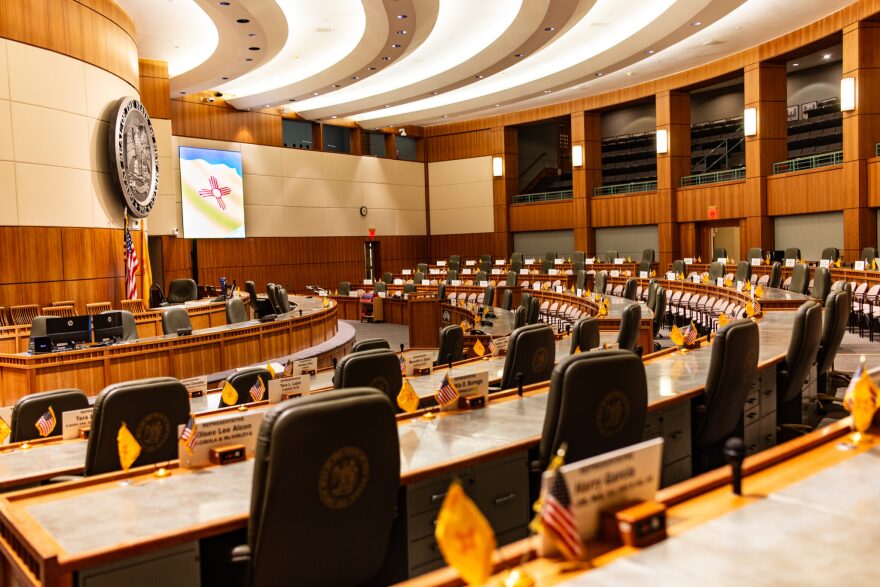A group of organizations including Common Cause of New Mexico and the League of Women Voters are pushing for bills in the current session they say will modernize the legislature. Those include extending the length of the sessions, and also paying lawmakers, an effort that has been years in the making since New Mexico is the only state with an unpaid legislature. Mason Graham, policy director for Common Cause New Mexico, talked with Lou DiVizio on New Mexico in Focus about why paying lawmakers should be part of modernizing.
MASONGRAHAM: You know, many of our legislators have full time jobs. We're called a citizen -ed legislature for that reason. So when they are not in session, or even some of them during session, they're working that full time job as well. And then outside of session, there's been some studies to show that, you know, our state representatives and our state senators spend about 20 hours a week doing legislative responsibilities, and all that goes unpaid. You know, there is a financial barrier to even wanting to be a legislator, so we think that creating this independent salary commission would open up opportunities for people who want to serve, and then overall, relieve some of that financial burden on some of our legislators.
NMPBS: Now you talk about that resolution to create the citizen commission that would then figure out what paying lawmakers would look like. What are the chances right now that passes? Are you thinking that it's positive at this point?
GRAHAM: Well, things aren't very positive, but I'll keep a positive spin on it. Okay, so it was introduced early. It was Senate Joint Resolution 1. It did get two committee hearings, and in that second hearing, it actually landed on a tie vote. Currently, right now, it is kind of in limbo in the Senate, because this is a constitutional amendment as well. There are some questions about whether this is going to pass in front of the voters. It has gone to the voters before, way back in 1990, and it failed. So I think that gives some legislators some hesitancy as well, but we did have another route to go in the house. So House Joint Resolution 18 is like essentially a duplicate of that bill, and we're expecting its first committee hearing soon.
NMPBS: The push to modernize something very much implies that the thing that is being modernized is antiquated. How should folks think about that dynamic when it comes to the New Mexico Legislature? Are we, in 2025, antiquated?
GRAHAM: I would say so absolutely. And I think that is reflected by some of the biggest challenges in our state. You know, every session we go in with a lot of things on our mind, particularly the rate of crime, poverty, climate change, and our legislators are really pressed for time to bring those issues and solutions to the table during session or outside of session. They're not being compensated for any of the work that they do so, the research, the working with organizations, finding the solutions, traveling to other places, like conferences, where they can hear from some of their other colleague, legislators and other states they're not being compensated for. So only those who have the financial stability to take those opportunities are doing so, and some of the others you know, may have to put some of these legislative responsibilities to the wayside, not holding, you know, constituent services and holding town hall meetings and then the lead up to legislative session as well.
NMPBS: If lawmakers were to be paid, how might that change the makeup of the legislature? Is there any concern that we might create an environment where career politicians are governing us, and they aren't as tied into the community?
GRAHAM: I'd argue that we already have career politicians, and many of our legislators right now have served for decades, and the people who are able to do that are those that are financially stable. They're very resourceful. They're in a district that may have some insulation as far as challenges to their incumbency, so they don't have to worry about things like, you know, being challenged, or the financial burden on them if they go to session every year in the work that they do. And a lot of them also are retired, so they don't have an additional job that they need to keep up with. So all of those things combined allow them to be a “career politician,” as in the work that they do is entirely revolves around being a legislator or being in politics. It's not a bad thing to have somebody who has the experience, the institutional knowledge, and knows how to govern and knows how to administrate and knows how to be a legislator. Unfortunately, right now, many legislators are coming in, serving one or two terms, and saying, “This isn't sustainable for me, this isn't sustainable for my family. There's a big burden on myself and my loved ones,” and they have to balance whether or not doing this role as a legislator is worth it, and unfortunately, that's the reality. It really shouldn't be. You know, someone shouldn't have to choose between serving their state and serving their community and also taking care of their family.
See the full interview with Mason Graham on New Mexico in Focus' YouTube channel.





